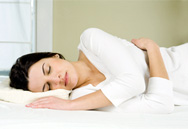What exactly is a normal sleep cycle? Well, that depends on the person. Many people often ask if their regular sleep hours are “normal” and what’s interesting about that is, like most things about us, our sleep cycles are different from person to person. Sure, the basic architecture of normal sleep phases is similar, but what constitutes “normal” in one person, may not be in another.
Some people naturally have a circadian rhythm where they are most rested if they sleep later and wake up later; while for others, sleeping early at night and waking up early in the morning is the only way they can feel rested.
Let’s go through the basics of a sleep cycle. There are essentially four stages of sleep with three being in Non-REM (rapid eye movement) sleep and one in REM sleep, where you have active dreams and your eyes move back and forth during this stage of sleep. Stage 1 is where you transition to sleep and you are easily awakened and your muscles start to relax and your brain waves change into a different pattern as compared to when you are awake or alert. Stage 2 is true sleep, which lasts usually about 10-25 minutes where your heart rate slows, your eyes stop moving, and your body temperature decreases. Stage 3 is deep sleep where if you were awakened, you would feel groggy. Your heart rate is slow and blood is directed towards your muscles to help with cellular recovery and your brain waves are slow. First REM cycle happens about 70-90 minutes into sleep and your arms and legs are paralyzed and your breath is shallow with rapid eye movements and dreaming. The four stages occur several times throughout the night depending on how long you are asleep.
 Disruptions of sleep patterns or inability to achieve certain stages of sleep can occur with stress, medications, bowel and bladder disruptions, background noise or pets, just to name a few factors. If you are consistently waking up tired, you should have a sleep study done to make sure that you don’t have medical issues such as hypopnea, obstructive sleep apnea, restless leg syndrome, or many other sleep disorders.
Disruptions of sleep patterns or inability to achieve certain stages of sleep can occur with stress, medications, bowel and bladder disruptions, background noise or pets, just to name a few factors. If you are consistently waking up tired, you should have a sleep study done to make sure that you don’t have medical issues such as hypopnea, obstructive sleep apnea, restless leg syndrome, or many other sleep disorders.
If you have regular sleep architecture of the stages, but you are maybe just needing some assistance in turning off your mind to be able to fall asleep, there are a few tricks you can try to help you sleep better.
First of all, you should determine how many hours of sleep you need to feel the most rested. It is usually recommend that you think back to when you were on vacation and figure out when your body naturally wanted to sleep while on vacation when you were on a relaxing trip that wasn’t filled with late night partying (please do not use late night partying or socializing bedtime as a barometer). Then think back to when your body naturally awakened feeling refreshed. The number of hours between a night of naturally going to bed and waking up is approximately the number of hours your body naturally needs to feel rested.
Once you have determined that, then you should aim for those sleep hours even at home when possible. It’s important to practice good sleep hygiene so that you can get good quality of sleep. Here are some tips:
- Go to bed around the same time and wake up around the same time every day, even on weekends.
- Do not drink a lot of liquids or eat heavy foods before bed. Avoid caffeine and sugary foods if you have trouble with insomnia.
- Turn off all TV and electronics about an hour before bed. Avoid stimulating activities, books, music, movies, and shows about an hour before bed.
- Dim the lights about 30-60 minutes before bed.
- Turn all lights and clocks away from you around the bed.
- Make sure the curtains block out outside lights.
- Keep room temperature on the cool side to help you fall asleep.
- Do not lie in bed except to sleep or to have sex so as to keep your association of the bed to these activities only. Do not read or eat or watch TV in bed. This may allow your mind to associate awake activities with being in bed.
- White noise may help you sleep if you find that to be comforting.
- Avoid pets in the bed if they disrupt your sleep.
These tips should help you get going on good sleep hygiene. Once you are comfortable with these steps, if you are still having trouble sleeping, consult your chiropractor about potential supplements. You should help your own circadian rhythm and sleep cycle find its own healthy pattern. Finding ways to try to optimize your body’s natural cycles and rhythms are generally the best way to go for initial attempts at changing lifestyle patterns.
Dr. Julie T. Chen